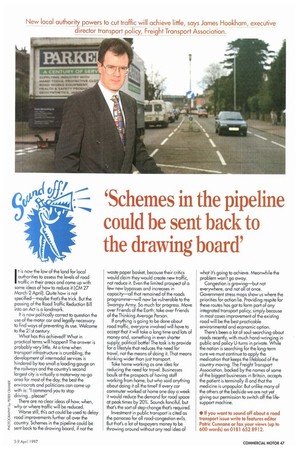'Schemes in the pipeline could be sent back to the drawing board'
Page 49

If you've noticed an error in this article please click here to report it so we can fix it.
It is now the law of the land for local authorities to assess the levels of road traffic in their areas and come up with some ideas of how to reduce it {CM 27 March-2 April). Quite how is not specified—maybe that's the trick. But the passing of the Road Traffic Reduction Bill into an Act is a landmark.
It is now politically correct to question the use of the motor car and legally necessary to find ways of preventing its use. Welcome to the 21st century.
What has this achieved? What in practical terms will happen? The answer is probably very little. At a time when transport infrastructure is crumbling, the development of intermodal services is hindered by too small a loading gauge on the railways and the country's second largest city is virtually a motorway no-go area for most of the day, the best the envirocrats and politicians can come up with is: "I command you to stop driving.. please!" There are no clear ideas of how, when, why or where traffic will be reduced. Worse still, this act could be used to delay road improvements further all over the country. Schemes in the pipeline could be sent back to the drawing board, if not the waste paper basket, because their critics would claim they would create new traffic, not reduce it. Even the limited prospect of a few new bypasses and increases in capacity—all that remained of the roads programme—will now be vulnerable to the Swampy Army. So much for progress. Move over Friends of the Earth; take over Friends of the Thinking Average Person. If anything is going to be done about road traffic, everyone involved will have to accept that it will take a long time and lots of money and, something in even shorter supply, political bottle! The task is to provide for a lifestyle that reduces the need for travel, not the means of doing it. That means thinking wider than just transport. Take home working as one idea for reducing the need for travel. Businesses baulk at the prospects of having staff working from home, but who said anything about doing it all the time? If every car commuter worked at home one day a week it would reduce the demand for road space at peak times by 20%. Sounds fanciful, but that's the sort ot step-change that's required. Investment in public transport is cited as the panacea for all road-congestion evils. But that's a lot of taxpayers money to be throwing around without any real idea of what it's going to achieve. Meanwhile the problem won't go away. Congestion is growing—but not everywhere, and not all at once. Government stress maps show us where the priorities for action lie. Providing respite for these routes has got to form part of any integrated transport policy, simply because in most cases improvement of the existing road will be the best practicable environmental and economic option. There's been a lot of soul-searching about roads recently, with much hand-wringing in public and policy U-turns in private. While the nation is searching for the long-term cure we must continue to apply the medication that keeps the lifeblood of the country moving. The Freight Transport Association, backed by the names of some of the biggest businesses in Britain, accepts the patient is terminally ill and that the medicine is unpopular. But unlike many of the others at the bedside we are not yet giving our permission to switch off the lifesupport machine.




































































































